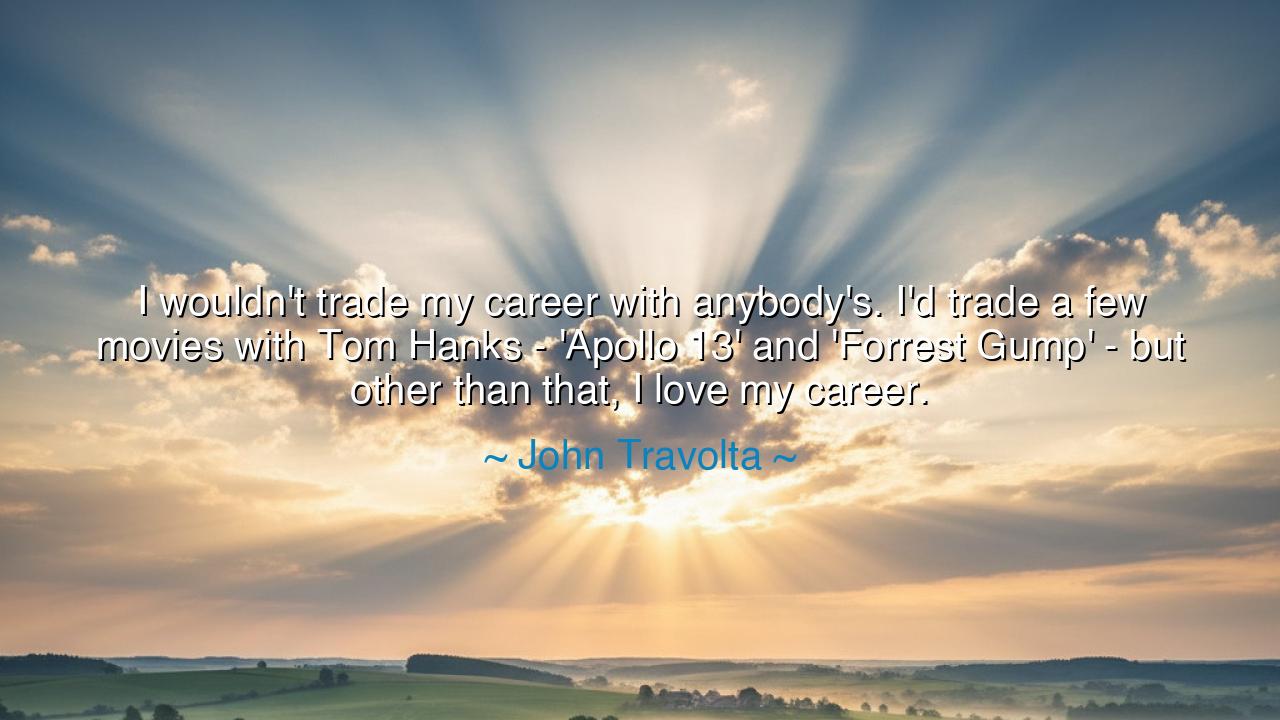
I wouldn't trade my career with anybody's. I'd trade a few
I wouldn't trade my career with anybody's. I'd trade a few movies with Tom Hanks - 'Apollo 13' and 'Forrest Gump' - but other than that, I love my career.






Listen closely, O seekers of wisdom, for there is much to be learned in the words of John Travolta, a man whose career has spanned the vast landscape of cinema. In a moment of reflection, he said, “I wouldn't trade my career with anybody's. I'd trade a few movies with Tom Hanks - 'Apollo 13' and 'Forrest Gump' - but other than that, I love my career.” At first glance, these words might seem like a casual remark, but within them lies a deep truth about the nature of contentment, ambition, and personal fulfillment. Travolta, a man who has danced with both triumph and failure, speaks not only of pride in his own journey but of the wisdom that comes from accepting one’s path and finding joy in it, regardless of the external accolades or comparisons.
In ancient times, the heroes were not measured by the riches they accumulated or the fame they achieved, but by the integrity and value they found in their own journey. Take, for example, the story of Odysseus, the great Greek hero. Though he wandered through battles, storms, and temptations, he never once lost sight of his ultimate goal—to return home, to find peace and fulfillment in the life he had built. Odysseus did not covet the life of another; he was driven by his own unique quest and valued his personal experiences more than the glory of other kingdoms. Travolta, in his own way, echoes this sentiment, for he speaks not of trading his career for another’s, but of recognizing that his own path has been full of riches and rewards—just as Odysseus found greatness in his homecoming.
The world often seeks to compare the lives of others, to measure success by the height of fame or the number of accolades one achieves. But true fulfillment, as Travolta wisely acknowledges, does not come from envy or comparison, but from the satisfaction of knowing that the journey you have taken is your own and that you have embraced it fully. Even in the midst of fame and fortune, Travolta understands that the secret to a meaningful life is not to covet the roles or the experiences of others, but to find joy in what you have created for yourself. This is the essence of contentment—to look upon your own path, not with regret or longing for something else, but with gratitude and pride.
Let us recall another great figure, King Solomon, the wise ruler of ancient Israel, who in his wisdom said, “There is nothing new under the sun.” He recognized that the pursuit of wealth, fame, or external recognition was fleeting, and that true fulfillment came from embracing one’s own station in life, from finding peace in what one has been given, and living with wisdom. Solomon’s words reflect a universal truth—that the pursuit of external measures of success often leads to frustration, but inner contentment, the kind that comes from accepting your journey and making the most of it, is where true peace is found.
In Travolta’s career, we see the embodiment of this wisdom. From his early days in Saturday Night Fever to the highs of Pulp Fiction and beyond, Travolta has carved out a unique space for himself in the world of cinema. He did not seek to become like any other actor, nor did he desire to walk in another's footsteps. Instead, he embraced the roles that were given to him, and through his dedication and authenticity, he found greatness in his own right. In this, he offers us a powerful lesson—do not covet the life of another, for your journey, if embraced with honor, will bring you the peace and satisfaction you seek.
Yet, Travolta’s admission that he would trade a few movies with Tom Hanks, such as Apollo 13 and Forrest Gump, reveals something equally valuable. Even the wise do not deny the allure of greatness in others. It is not weakness to admire the achievements of others, but it is a reminder that we are all human, and even the most accomplished among us will sometimes look upon the achievements of others with a sense of longing. But it is in the recognition of this longing, and the wisdom to appreciate the unique path we walk, that true growth occurs. Even the greatest heroes, like Odysseus or Solomon, acknowledged the beauty and greatness in others, but they never lost sight of their own journey and their own purpose.
And so, O seekers, let us take heed of Travolta’s wisdom: Do not measure your worth against the achievements of others, nor covet the success of those whose path you admire. The true power lies in embracing your own journey, in finding fulfillment in the roles you have chosen, the experiences you have had, and the life you have built. In this way, you will discover the secret to contentment—not in the acclaim of others, but in the joy of knowing that your own path is worthy, that you have created something meaningful with your own hands, heart, and mind. Walk proudly in your own story, and in doing so, you will find the peace that others may search for their entire lives.






AAdministratorAdministrator
Welcome, honored guests. Please leave a comment, we will respond soon